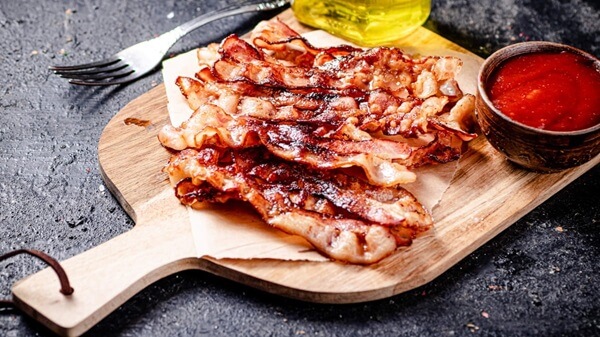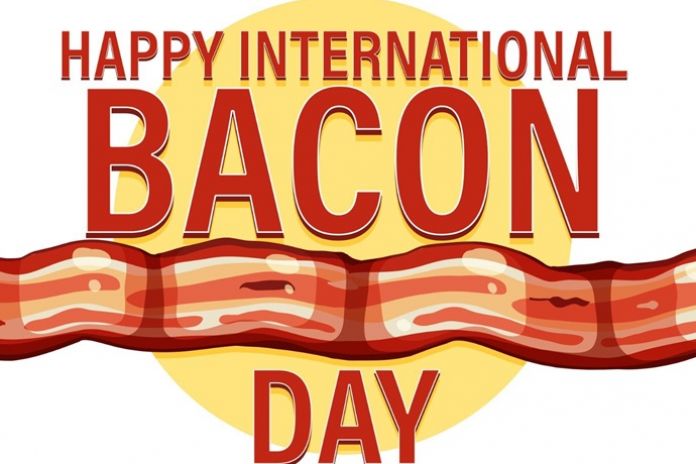International Bacon Day is an unofficial holiday celebrated on the first Saturday in September each year. Although it’s recognized worldwide, some cultures celebrate it on different dates, such as February 19 and the first Saturday of January Bacon, which is pork meat cured with salt and then dried or smoked, has a unique taste and is a staple in American cuisine.
History of International Bacon Day
Salted pork was first enjoyed in ancient China and the practice of curing pork spread through the Roman Empire. In medieval times, Anglo-Saxon peasants also used bacon fat for cooking.
The word “bacon,” or “bacon,” comes from Middle English and has influences from French and German. It originally referred to all types of pork until the 16th century.
Spanish explorer Hernando de Soto is often called the ‘father of the American Pork Industry.’ He brought 13 pigs to the New World in 1539, and within three years, his herd had grown to 700. The rest is history.
Bacon Day was established in 2004 by a group of CU Boulder graduate students from Colorado. At Bucknell University, students celebrate their version of Bacon Day by eating as much bacon as possible and calling themselves ‘Meatheads.’
In the U.K., Bacon Day is celebrated around January 14, just before winter exams, as a way to procrastinate and fuel up for studying.
In the U.S., bacon comes from the belly of a pig, while meat from the pig’s loin is called Canadian bacon. Bacon is usually smoked with mesquite, hickory, or maple wood, and sometimes extra ingredients are added to boost the flavor. It’s commonly enjoyed for breakfast, in B.L.T. sandwiches, or just on its own.
| 12th Century (Bacon Traditions) | In the English town of Great Dunmow, a church started a tradition of awarding bacon to married men who could swear they hadn’t argued with their spouse for a year and a day. |
| 16th Century (One for All) | The term ‘bacoun’ is used for all pork meat. |
| 18th Century (First Bacon Plant) | John Harris opens the first bacon processing plant. |
| 2009 (Friend or Foe?) | Bacon has a bad reputation due to its high saturated fat and high sodium content. |
Five Interesting Facts About Bacon
- Bacon Production: Over two billion pounds of bacon are produced annually in the U.S.
- Bacon’s Age: Bacon is one of the oldest preserved foods in the world.
- Bacon for Making Bombs: During World War II, people donated excess bacon fat to the military to help produce bombs using the extracted glycerin.
- The Meaning of Bacon: The word “bacon” originally referred to “meat from the back of an animal.”
- The Breakfast Club: In the U.S., 70% of all bacon is enjoyed at breakfast.

The Cultural Significance of Bacon
Bacon’s popularity extends beyond its taste; it has become a cultural phenomenon. From bacon-themed festivals to bacon-flavored products, its influence is pervasive.
In the United States, bacon is often associated with comfort food and indulgence. It’s featured in a variety of dishes, from breakfast classics like bacon and eggs to more unconventional uses such as bacon-wrapped hot dogs and bacon-flavored ice cream.
In popular culture, bacon has taken on a nearly iconic status. The “bacon craze” began in the early 2000s, fueled by social media and bacon-themed merchandise.
Bacon memes, such as “Bacon is the duct tape of food” and “I love bacon,” have proliferated online, further cementing its place in contemporary culture.
Bacon and Health
While bacon is undeniably tasty, it’s important to consume it in moderation due to its high fat and sodium content. Eating too much bacon can contribute to health issues such as high blood pressure and heart disease.
However, enjoying bacon as an occasional treat can be part of a balanced diet. Opting for leaner cuts of bacon and using healthier cooking methods, such as baking rather than frying, can help mitigate some of the health concerns.
Conclusion
In conclusion, International Bacon Day is a delightful celebration of one of the world’s most beloved comfort foods. Whether enjoyed for its rich history, unique taste, or cultural significance, bacon holds a special place in many hearts and cuisines around the globe. From its ancient origins and medieval traditions to its modern-day prominence, bacon has continually evolved, influencing everything from culinary trends to popular culture.
While it’s essential to savor this savory treat in moderation due to its high fat and sodium content, bacon remains a versatile and cherished ingredient that brings joy to countless meals. So, whether you’re participating in Bacon Day festivities or simply enjoying a slice on a regular day, bacon’s enduring appeal is a testament to its flavorful legacy and its ability to unite people in a shared love of good food.
Frequently Ask Question
What is the cultural significance of bacon?
Bacon is more than just a food; it has become a cultural phenomenon. It’s featured in a variety of dishes and has inspired bacon-themed festivals and products. The “bacon craze,” fueled by social media and bacon-themed merchandise, has solidified bacon’s iconic status in popular culture.
What are the health considerations related to bacon?
Bacon is high in fat and sodium, which can contribute to health issues like high blood pressure and heart disease if consumed in excess. However, bacon can be enjoyed as an occasional treat within a balanced diet. Opting for leaner cuts and using healthier cooking methods, such as baking, can help reduce some health concerns.
How did bacon become a part of popular culture?
Bacon’s rise in popular culture can be attributed to the “bacon craze” of the early 2000s, driven by social media and bacon-themed merchandise. Bacon memes and slogans like “Bacon is the duct tape of food” have further cemented its place in contemporary culture.
Also read, National Mochi Day – August 8, 2024
